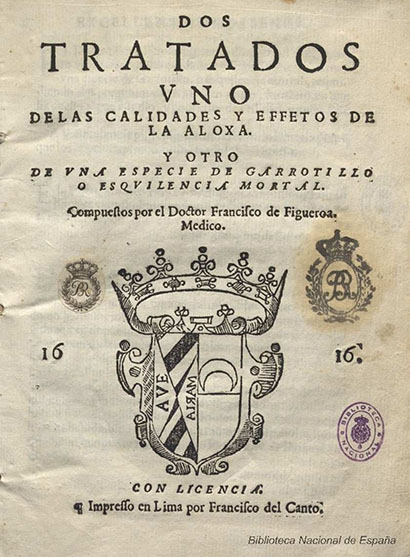
Libraries
Libraries
Dos tratados, uno de las calidades y efectos de la aloja; y otro de una especie de garrotillo o esquilencia mortal
The doctor Francisco de Figueroa obtained a doctorate degree from the Hispalense University and, in the 1590s, he arrived in Lima with his family. He soon joined the Antarctic Academy where he made friends with distinguished Creole and peninsular lawyers. His poems appear in the preliminaries of Arauco domado (canción) and Miscelnea Austral (sonnet).
This volume is made up of two treatises: the first one dedicated to the benefits of the lodge drink and; the second, to a deadly stick or shear condition. The lodge (aloxa) is a refreshing drink spread by the Arabs in the Mediterranean that has a long tradition that goes back to ancient Greco-Roman references. The one consumed in Spain was made of water, honey and various spices. Figueroa does not stop at its varieties and recipes, so it is to be expected that it is the most widespread (refined honey, ginger powder, yeast, pepper, nutmeg, cinnamon and spring water). It was common at the time, as confirmed by Figueroa, for it to be treated as a refreshing drink cooled with snow.
The epidemics that ravaged the passage from the 16th to the 17th century (plague, syphilis, measles, diphtheria -called garrotillo- and even melancholy) warn us of the behavior of societies in crisis situations. The COVID-19 pandemic of the 21st century reveals that couples with medical treatments run diverse responses of a cultural and even sacred nature. Just as in the Viceroyalty of Peru miraculous or magical treatments were used, there were attempts such as that of Francisco de Figueroa to address a garrotillo epidemic from a medical perspective in force at the beginning of the seventeenth century.
Jean Christian Egoavil
Proyecto Estudios Indianos

